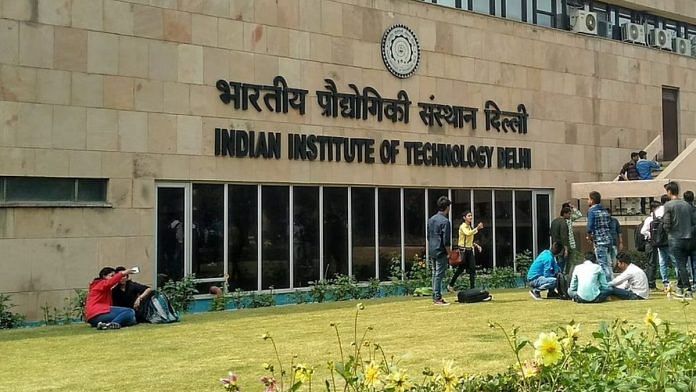New Delhi: The elite Indian Institutes of Technology (IITs) have made a push for greater financial autonomy, asking the central government to allow them to own equity stakes in companies that spin out using the institutes’ resources, ThePrint has learnt.
Currently, none of India’s 23 IITs is allowed to own equity in any company. But if the education ministry accepts the institutes’ proposal, it will be in step with a practice followed by international universities such as the Massachusetts Institute of Technology (MIT) and the University of Oxford.
The move was first mooted at the 18 April meeting of the IIT Council — the governing body for all the Indian Institutes of Technology. At the meeting, chaired by Union Minister of Education Dharmendra Pradhan, owning equity in spinout companies was recognised as the “need of the day”.
ThePrint has accessed the minutes of the meeting.
It was IIT Bombay — which broke into the top 150 educational institutions in the world in the latest round of QS rankings — that made the suggestion of “non-speculative holding of equity by IITs”, the records show.
“Director, IIT Bombay, presented a proposal on this matter,” read the minutes. “The intent behind the proposal was appreciated by the council as the need of the day and it was decided that further deliberations on the issue may take place in IITs”.
ThePrint reached the Ministry of Education by phone and text message and emailed a detailed questionnaire. This report will be updated if and when a response is received.
But IIT officials involved in the discussions told ThePrint that the idea is to remove the restriction on holding stakes in companies — including startups — that come up using the institutes’ logistical or intellectual resources.
Apart from companies emerging out of their own incubators — specialised hubs meant to help early-stage companies run their businesses — IITs also want the government to consider allowing them to hold equity stakes in startups that have taken the assistance of its students or faculty members.
“We are producing a large number of companies. And not everything is in our incubators, as students and faculty members are also assisting emerging companies outside. But in return, we cannot accept money. In this regard, we thought it could be a good idea to take equity stakes so that if the company becomes big, we can encash it. It will only add to our revenue base. This is a policy followed by most top universities globally,” an IIT director told ThePrint.
Also Read: ‘Paying entire mess staff’s salary’ — close to 400 IIT-Delhi students protest hostel mess fee hike
Revenue generation
According to Stanford University’s research policy handbook, owning equity stakes in spinout companies may not always be beneficial as “whether or not it (equity) will acquire value will depend on the overall success of the company, which is a function of many factors that may not relate to the technology being licensed or the educational content being distributed”.
Another IIT director ThePrint spoke to agrees, but also says there’s not much to lose and everything to be gained, especially when companies eventually become unicorns — a privately held startup with a valuation of at least $1 billion.
“See, if the company winds up, there is no loss involved in our end. But if the company makes it big, there’s a lot of revenue that gets generated. If even two companies become unicorns, then even a small stake can give us huge returns,” he said.
While most US universities own small equities in spinouts, in the United Kingdom, institutions’ insistence on owning large stakes has become an issue over the years. For instance, the University of Oxford’s policy mandates that the institute will hold a stake of up to 20 percent in such ventures.
For now, the IITs have not decided on any cap on the size of the stakes.
“It will depend on the extent of our involvement. If there is a sizeable contribution, our stake could be large,” the first director quoted said.
Currently, IITs are allowed to accept shares or stocks as donations. “The rule is to encash such donations within a year. But if the government accepts the proposal, we can hold equity in companies for years. Because initially it may not be tradeable. We can wait for the opportune time and sell it to raise funds,” said an official at one IIT.
In the past few years, the IITs have started accepting donations in the form of transfer of stocks and maintaining endowment funds — a pool where donated money is brought together and invested in securities.
While western universities also invest a portion of their endowment funds — primarily made up of donations from the alumni — in stock markets, the IITs are not adopting that approach.
“We invest our funds in fixed deposits. Currently, we do not have any plans to invest in markets,” said Commander Sunil Kumar (retd) , the public relations officer of IIT Indore.
An IIT Delhi official said that under current regulations, up to 15 per cent of the investable deposits in the endowment funds can be invested in corpuses such as the Employees’ Provident Fund.
IIT Delhi was the first among the 23 IITs to launch its endowment fund in 2019.
But even in the case of holding equities in companies, there are hurdles.
“First, we’re not talking about any speculative markets. There’s no question of going into the market. And secondly, even in the case of holding equities, there are taxation issues because IITs are exempted from paying tax. So we need to figure out these aspects, like whether the returns from such equities will be taxable or not,” said an IIT director quoted earlier.
According to the records of the IIT Council meeting, the education ministry will also “examine and resolve” the regulatory and taxation aspects of the proposal.
(Edited by Uttara Ramaswamy)
Also Read: IITs revamp curriculum, make study holistic and relevant to industry standards



